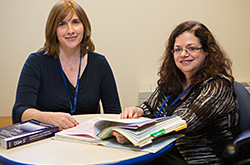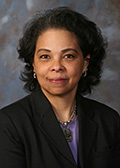

Supporting "Preemies"
Challenges of Prematurity: Tackling Learning and Developmental Disabilities
The birth of a premature baby raises considerable concerns for parents. Certainly the numbers are unsettling. Nearly half a million infants are born prematurely in the United States each year – that is, about one in nine babies are born before 37 weeks of gestation, according to the Centers for Disease Control and Prevention (CDC). Less than 1 percent of these preemies, or approximately 29,000 infants born annually, fall into the very early, or "micro-preemie" range of 27 weeks or earlier. Globally, one million children die from the complications of prematurity, making it the leading cause of death in newborns and the second-leading cause of death in children under age 5, according to the World Health Organization.

Drs. Lisa Shulman and Iris LesserAbout one-quarter of very preterm infants experience a severe disability, such as cerebral palsy, intellectual disability, autism, blindness or deafness, according to Dr. Iris Lesser, assistant professor of pediatrics and director of the School-Age Unit (SAU) at Einstein's Children's Evaluation and Rehabilitation Center (CERC). A third of all preemies will develop less severe neurodevelopmental and/or neurobehavioral disorders, including learning disabilities and attention-deficit/hyperactivity disorder (ADHD), which also occur in children born at full term. Surprisingly, the remainder of preterm children don't manifest any of these disabilities.
"While premature birth does raise a child's risk of having a learning disability or other developmental issues, it is not the sole determinant," noted Dr. Lesser. "Other factors, such as genetics, can play a role, too. That's why it is critical to have your child evaluated if you have concerns."
Difficulties with Development and Learning
One of the most publicized early-childhood disabilities for which prematurity can be a risk factor is autism spectrum disorder, a complex neurodevelopmental disorder characterized by a range of difficulties with social interaction, communication, and the presence of restricted interests and repetitive behaviors. But others are more common.
Learning disabilities include a range of disorders, including dyslexia (a specific learning disability in reading); these disorders affect a school-age child's ability to receive, process, store, or process information. Preterm children, even those who do not have moderate or severe neurodevelopmental impairments, can also experience difficulties with visual-spatial and working memory that affect their mathematics performance, information retention and retrieval, ability to pay attention, task planning and completion, and comprehension capabilities.
With so many potential risks for premature infants, what's a parent to do?
Identifying Problems and Seeking Assistance

Dr. Deborah Campbell"Engaging and working with families to facilitate early identification and intervention is paramount to optimizing the child's outcome, particularly for infants born very preterm," said Dr. Deborah Campbell, chief, division of neonatology, Children's Hospital at Montefiore (CHAM) and professor of pediatrics at Einstein.
Each year, about 7,500 individuals and families receive diagnostic and therapeutic services at CERC, which is part of the Rose F. Kennedy University Center for Excellence in Developmental Disabilities Education, Research and Service. Programs such as CERC's Infant and Toddler Team (ITT) and Montefiore's LEAP offer periodic developmental surveillance and screenings to families of premature infants. Once delays are identified, the ITT also provides diagnostic assessments to guide intervention planning. Families are connected to early intervention services in their homes and communities and are offered a wide range of therapeutic services for young children on site at the center. As they get older, other units at CERC, including SAU, provide additional assessment, treatment and follow-up services, as needed.
The full spectrum of programs and services offered at CERC reflect the broad variety of challenges that premature children face. Offerings include interdisciplinary units that address children's needs at each stage of development, from infancy to adolescence, with specialty programs for children with problems including learning disability, autism, cerebral palsy, and hearing impairment.
Available services include: physical, occupational, speech and language and auditory habilitation, feeding and nutrition therapies; special instruction, psycho-educational intervention, behavior management, play therapy, and social skills training; "mommy and me", language and handwriting groups, and parent support. Medication management for ADHD, a seizure clinic, special care dentistry and genetics services are available as well. The center also assists families with obtaining needed specialized adaptive equipment (such as braces, adaptive strollers or hearing aids) and with accessing entitlement services such as Medicaid and supplemental security income available through Social Security.
Information Is Ammunition
CERC clinicians agree that parents today – especially those of preemies – are better informed about their children's development than when the center was founded in 1956. Such early identification of disabilities is the key for their children to enjoy better outcomes.
"Early identification means early services," noted Dr. Lisa Shulman, director of infant and toddler services at CERC. "Children with autism, for example, don't learn well casually, from their environment. They need to be taught. Being able to do that at an early age is absolutely vital."
The same is true as children grow older, according to Dr. Lesser.
"Special education, regardless of the disability, is about differentiated instruction. The earlier we can understand a child's strengths and weaknesses, the earlier we can capitalize on the strengths," she said.
Early identification is also important because learning disabilities can evolve and, unaddressed, can grow more complex to treat. "Preemies often present with speech delays, which isn't surprising," said Dr. Lesser. "But those problems often morph into other things."
Because CERC clinicians provide a comprehensive range of services, the center is well-equipped to help parents identify and respond to those shifting problems as their children grow, added Dr. Shulman.
"This is a full-service place," she said. "Whatever a premature child or the parent of one needs, we're in a position to help."
The one-stop-shop approach is especially helpful for parents who don't have the resources, time or knowledge to navigate the complexities of medical and educational services.
"In some ways, the medical system and education system aren't well-linked, and when it comes to a child's development, they need to be," said Dr. Lesser.
"It's hard to negotiate the systems on your own. Parents of preemies, parents of kids with autism, with cerebral palsy, or with learning and other developmental disabilities, they all come into CERC just overwhelmed by the huge boulder that's suddenly in their path. We show them that you may not be able to get over the boulder, but you may be able to get around it. If not, most parents appreciate having professionals on their side to help them deal with their child's problems to maximize their quality of life."
Posted on: Monday, October 14, 2013


